You Did It!
Graduated Betty
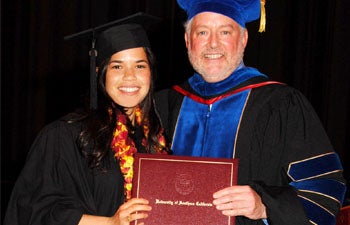
Golden Globe and Emmy-winning America Ferrera stands with her mentor Steven Lamy, professor of international relations and vice dean for academic programs in USC Dornsife. Ferrera earned her bachelor’s in international relations. Photo by grad images.
As an international relations major in USC Dornsife, Golden Globe-winner America Ferrera had a worldly perspective when she recently embarked on several many-hour discussions with Helen Chávez.
Ferrera was at ease and knew the issues in her conversations with the wife of the American labor leader César Chávez, who cofounded the United Farm Workers.
Playing the part of Helen Chávez in the upcoming film Chávez directed by Diego Luna, Ferrera spent time with the wife of the late leader who organized 50,000 farmworkers in California. Ferrera said her education made her feel confident speaking on international matters with a woman, who along with Dolores Huerta, is among the biggest civil rights icons in the United States.
“I am using so much of what I learned in the School of International Relations in my life,” Ferrera said. “I’ve learned about the root causes of so many issues I’m passionate about and how to improve people’s lives. Sometimes, the issues have taken me across the world, sometimes here in our own backyard.”
In 2010, Ferrera partnered with Save the Children, a nongovernmental organization dedicated to improving the lives of disadvantaged children in the United States and worldwide. As an artist-ambassador, she traveled to the village of Diassadeni, Mali, to help the organization raise funds to build a school.
Ferrera arrived in USC Dornsife in Spring 2003 at age 18, shortly after her breakout role in the hit independent film Real Women Have Curves. She became involved in the Joint Educational Project (JEP) and other programs, then starred in a number of blockbuster movies such as The Sisterhood of the Traveling Pants and its sequel.
By the time she took the lead role in Ugly Betty, the 2006 to 2010 television series that earned her an Emmy, her education became a minor character. A decade after she began, with the encouragement and help of her mentors in USC Dornsife, she earned her bachelor’s on May 17.
“I was so close to finishing,” Ferrera said. “It always felt like an unfinished chapter.”
She gave a special shout out to Steven Lamy, professor of international relations and vice dean for academic programs, and international relations professor David Andrus, who shared with Ferrera how her films had helped him.
Mentoring a young Latina from the inner city, Andrus was having difficulty understanding her family dynamics. The girl told him: If you want to understand my life, you have to watch this movie.
The film was Real Women Have Curves in which Ferrera depicts a young Mexican American girl whose family expects her to work and help support them — while she wants to pursue higher education.
Watching the film prepared Andrus to meet with the young Latina student and her family and discuss her dream to get an education. The story made Ferrera realize that her films could be used to enlighten people on issues dear to her.
“Professor Andrus inspired me to not only learn about the world, but to stay true to my passion,” Ferrera said of Andrus, who died in 2004. “I wish he were alive today to see that I never forgot his message.” —P.J.J.
Late Bloomer
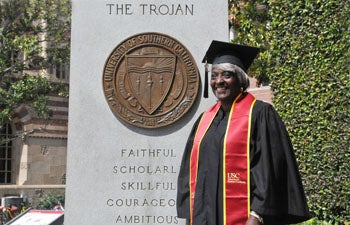
Cynthia Maxwell Dillard, 75, earned her bachelor’s in sociology. After opting to go to work after high school, she made a promise to her father at age 17 that she would return to college and earn her diploma. Photo by Pamela J. Johnson.
When Cynthia Maxwell Dillard’s sociology class discussed the 1967 Detroit riot, Dillard described the red glow of the fires, the looting, the gunfire, the fear she felt.
Dillard, 75, was there. Born and raised in Detroit, Mich., she was 29 when the riot broke out. Dillard, who graduated with a bachelor’s degree in sociology, shared with her classmates her personal insights into the political, economic and social factors at work, including police abuse and lack of affordable housing.
“My first thought was, ‘I’m not going to fit in with these kids,’ ” said Dillard, mother of six and grandmother of eight. “But it was just the opposite. I could connect to some of the topics we discussed on a deeper level.”
The year of the Detroit riot was also the year Dillard enrolled in college. At 17, she was accepted to Wayne State University in Detroit, but opted for a job with the federal government.
“My dad asked me not to take the job,” Dillard recounted. “I told him, ‘But you’ve always wanted me to be independent.’ He said, ‘Yeah, but you won’t go back to school.’ I told him I would go back to school, that I would just work a little bit, then go back.”
At 19, Dillard married and later had three children. “And life happened,” she said.
She took classes at various colleges, but many events complicated matters. Her younger sister died after an accidental overdose, then Dillard escaped an abusive marriage. The divorced mother moved to Los Angeles and re-connected with a childhood classmate, whom she had known since elementary school, Ernie Dillard. The two married, and Cynthia Dillard had successful careers in L.A., as a vice president in corporate banking then with Drew Child Development Corporation.
She enrolled in USC, where Ernie Dillard works in human resources as an employee relations manager. Then the couple’s house burned down and Dillard underwent replacement surgery on both knees. But Dillard never forgot her promise to her father, who died in 1984. She recently added her maiden name Maxwell to her last name so that her father’s name would be included on her diploma.
“If I make a commitment, I follow through,” said Dillard, choking up. “I made a promise and I kept a promise. And I did something that I was meant to do. I just didn’t do it in the time that I could have had I taken a different path.”
For her graduation party, Dillard, who wants to work for a nonprofit, said she looks forward to dancing to Etta James’ signature song, “At Last.” —P.J.J.
The Grad Day Walk
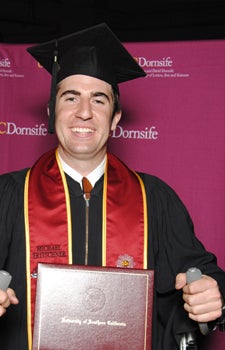
Michael Fritschner, captain of his high school football team, developed surfer’s myelopathy and is paralyzed from the knees down. To a standing ovation, he rose from his wheelchair and walked across the stage to accept his bachelor’s in international relations. Photo by grad images.
USC Dornsife international relations major Michael Fritschner rose from his wheelchair.
As he took his first tenuous step out of the darkened wings onto the brightly lit stage of the Shrine Auditorium, the audience held its collective breath.
Fritschner, a former high school athlete, who is paralyzed from the waist down, wore leg braces and used a walking frame to support himself as he slowly, but surely, advanced alone across the stage.
Professor of International Relations Steven Lamy, USC Dornsife’s vice dean for academic programs, was waiting center stage to award him his bachelor’s in international relations with a business minor.
Fellow graduates, faculty and guests rose spontaneously to their feet in a standing ovation.
Wearing a wide grin Fritschner paused half way on his journey across the stage to graciously acknowledge the now deafening cheers and applause. Once he received his degree, close friends, political science graduates Brad Barbagallo and Alex Wilson, were there to help him sink back into his wheelchair.
What most students take for granted — walking across the stage during graduation — had been a long-cherished dream for Fritschner. On May 17, his dream came true as the months of grueling practice, mixed with a hearty dose of sheer determination, paid off.
As a teenager, Fritschner was a talented athlete with a glowing future. He was captain of his high school football team and had been selected as varsity quarterback for his sophomore season. That was when he developed surfer’s myelopathy, a rare spinal cord injury caused by hyperextention of the back. The injury occurred while he surfed for the first time during a 2006 family vacation in Hawaii. The injury, sometimes referred to as “a stroke of the spinal cord,” took away his ability to walk.
“I could feel nothing from my chest down,” said Fritschner, who after years of physical therapy has now regained some feeling above his knees. “I was confused and scared.”
His ambitions of playing in the NFL were now in tatters. He credits the daily hospital visits from devoted friends for giving him the motivation to go on.
“All they cared about was being my friend and I realized I am so much more than just an athlete.”
Fritschner arrived at USC in 2009. A recipient of a scholarship from Swim with Mike, USC’s funding for physically challenged athletes, he described its founder Ron Orr, as “the most supportive guy on Earth.”
“I would not have been able to get through college without him,” said Fritschner who also paid tribute to Lamy, Liana Stepanyan, assistant professor of Spanish, and Stephen Silk of USC Marshall School of Business.
An inspirational embodiment of the Trojan motto “Fight on!” Fritschner, said: “It’s been my dream since I came to USC to walk across the stage at graduation.”
Fritschner’s family was there, including his 88-year-old grandmother who flew in from Texas.
“This really is a dream come true,” beamed Fritschner, who says he has no doubt that one day he will walk again. “Today is a reaffirmation that if you work hard, absolutely anything is possible.” —S.B.
Support System
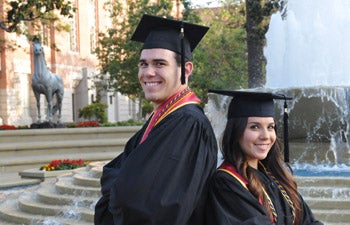
A year and a half apart, siblings Andrew and Rebecca Alonzo have followed the same academic path, both earning their bachelor’s in psychology. Both plan to attend law school. Photo by Pamela J. Johnson.
Siblings Andrew and Rebecca Alonzo are a bit more than a year apart.
“When people say describe your sister I tell them she’s me but a girl,” Andrew, 24, said. “We are mirror images of each other, just opposite sexes.”
After high school, both attended Mt. San Antonio College in the small city where they grew up, Walnut, Calif., 26 miles east of Los Angeles. Both were taking general education courses, unsure what they wanted to do.
“I didn’t have much direction,” Andrew said. “I was also unloading packages from trucks for UPS. I knew this was not something I wanted to do for the rest of my life.”
Leave it to younger sis to give him a nudge. Rebecca was eager to attend USC. They have uncles and cousins who are USC graduates and Rebecca wanted to be part of that kind of school spirit.
“All the time, I told my brother, I want to go to USC,” Rebecca said. Andrew said one day, “I had an epiphany.” He hunkered down and his grades skyrocketed.
“Alright, let’s do it,” he told himself. Both took psychology courses at community college. Not surprisingly, both became intrigued.
“It just snowballed from there,” Andrew said, who along with Rebecca earned a bachelor’s in psychology from USC Dornsife May 17.
While taking some classes together, the siblings were not competitive. Rather, if one excelled more, he or she would see what could be done to make sure the other sibling did better next time.
Half Czech and half Mexican, their mother is a case management hospital director and father, a retired mechanical engineer. The siblings said they made the right choice with USC Dornsife, which encouraged them to explore many disciplines.
Both volunteered at USC Dornsife’s Joint Educational Project (JEP), where Rebecca was a volunteer placement coordinator.
Now, both are applying to law schools. Andrew already works at a law firm in El Monte, Calif. Uncertain whether they will end up in the same law school, one thing is for sure. They have each other’s back. —P.J.J.
Community First
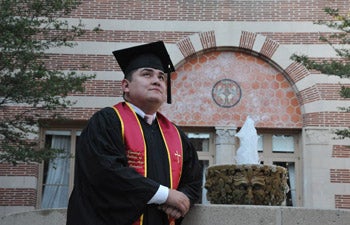
David Horacio Hernandez, a first-generation college student whose parents migrated from Mexico, was named the White House’s Champion of Change by the Obama administration. He earned his bachelor’s in political science and American studies and ethnicity. Photo by Pamela J. Johnson.
Migrating to Los Angeles from Jalisco, Mexico, the parents of David Horacio Hernandez taught their son the value of hard work and sacrifice.
“I came to USC with nothing, and it has given me everything,” said Hernandez, who earned his bachelor’s in political science and American studies and ethnicity.
A first-generation college student from Culver City, Calif., Hernandez arrived from Santa Monica College.
“USC was the big leagues,” he said. “When I first got to USC, I would never have thought I’d be in a position to help, empower, represent and be a voice for others.”
One year later, in 2011, the Obama administration recognized Hernandez’s commitment to the country’s youth by naming him one of the White House’s Champions of Change. Through the program, which honors everyday Americans doing extraordinary things for their communities, Hernandez participated in a roundtable discussion at the White House.
Hernandez interned with the U.S. Office of Personnel Management in Washington, in Rep. Karen Bass’ district office, and with Project Vote Smart. He also interned with Strategic Actions for a Just Economy, working to champion tenants’ rights and to stop housing discrimination.
“In American studies, these are things we explore — the disenfranchisement of people or segregation,” he said. “I’m bilingual, so I would go on a lot of these field visits and talk with the residents. It inspired me and really lit the fire for me. After that, I just became relentless in my pursuit of service.”
In April, Hernandez spent a week in Dubai at an Education Without Borders conference, where he presented on L.A.’s Latino youth and their access to education.
This year, he served as a delegate to the United Nations’ social commission for poverty eradication and youth unemployment.
At USC, Hernandez was director of civic engagement for the USC Latino Student Assembly and served as a student liaison to the USC Latino Forum, which recruits Latino students. One of his greatest champions at USC Dornsife was George Sanchez, professor of American studies and ethnicity, and history, and vice dean for diversity and strategic initiatives.
Hernandez has work lined up with Teach for America in L.A. He plans to earn a graduate degree before pursuing elected office.
“My pursuit has been rewarded in ways only imagined,” he said. “For that, I am forever grateful to my university and for being able to call myself a Trojan.” —M.S.
Read about the inspiring life of Ph.D. graduate Howard Wayne Harris